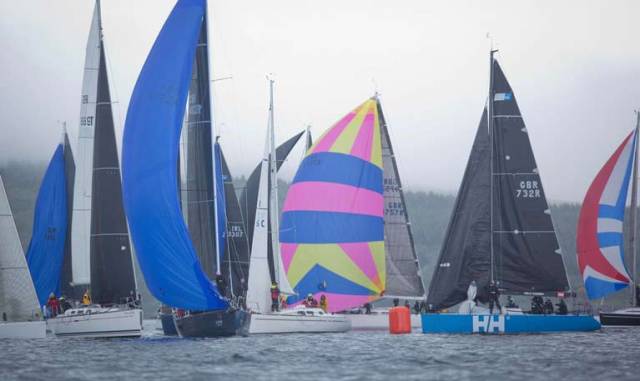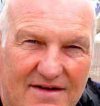Cork Harbour Olympic helmsman and Sailing Professional Mark Mansfield competed in May's Scottish Series and gives his views on the fleet at Tarbert.
I raced as tactician on Stuart Cranston's new acquisition, The Ker 32, Hijacker from Strangford Lough. This boat was previously Checkmate which raced for Ireland in the 2006 Commodore's Cup. She is a sister ship of the Ker 32 Voodoo Chile. This was her first race event in the new ownership and all were interested to see how she would go in the RC 35 Class, but more on that later.
The Scottish Series this year consisted of four days of sailing on Loch Fyne, with the regatta based in Tarbert. Some details of the event are:
Conditions
- Day one Three races sailed in Moderate conditions. One W/L race, One Olympic triangle race and one trapezoidal type race
- Day two Light airs, never getting above eight knots, but mostly around six. Only one race concluded. The second race started but was abandoned up the first beat.
- Day three Strong winds, 17—30 Knots. Full on conditions. One W/L race plus around the Loch race—Some beating, some reaching, some running.
- Day four No wind and no racing
Fleets
Fleets were generally small in the IRC classes, except the RC35 class. Fleets have been dwindling recently. Only six boats in classes one and three, seven in class four, and 14 in the RC 35 Class. The RC35 class was made up of 10 local Scottish RC 35 boats and four from Ireland.
Interesting Issues
In one race on Friday, the first fleet to go into sequence was class one. Just before the start sequence started, the Race Officer relaid the pin end mark. As very many boats now use start line GPS computers, like Racegeek or Velocitek, there were other class three, four and RC35 boats wanting to 'ping the pin'. As this was happening, two Class One boats had a collision, close to the Pin and in trying to avoid the collision, one of these Class One boats hit a Class Three boat, it was claimed.
Approx 15 minutes later, that Class Three boat started and went on to win her race. Once ashore they protested the Class One boat as damage was reported to have occurred. In the protest room, however, the International Jury decided to disqualify the Class Three boat because the sailing instruction said boats SHALL not be in the starting area, while another class is starting. The official protest noticeboard decision is here.
It is an interesting situation. In later races, boats from other classes were again clearly in the starting area when other classes were starting, mainly pinging the pin, but no action was taken against them.
"Race officers, I believe, need to allow time when moving start lines to allow boats to ping the line"
Nowadays, with increased technology coming into race boats, Race officers, I believe, need to allow time when moving start lines to allow boats to do what they need to do as regards pinging the line. Resetting a pin mark, then going straight into a sequence will inevitably lead to congestion around the line from other class boats.
Racing
As only six of the planned ten races were completed, no discard was allowed, affecting some boats badly.
Class One
Six entries. Four good boats here. Spirit of Jacana, the J133 from Northern Ireland won the class last year and clearly likes a breeze. In the end, Jay Colville's First 40, Forty Licks from Northern Ireland took the class by a narrow margin from Jonathon Anderson's Beautiful J122e, El Gran Senor from Scotland. Forty Licks was involved in that collision referred to earlier and also blew out a spinnaker on a windy day, so did well to take the series in Class One.
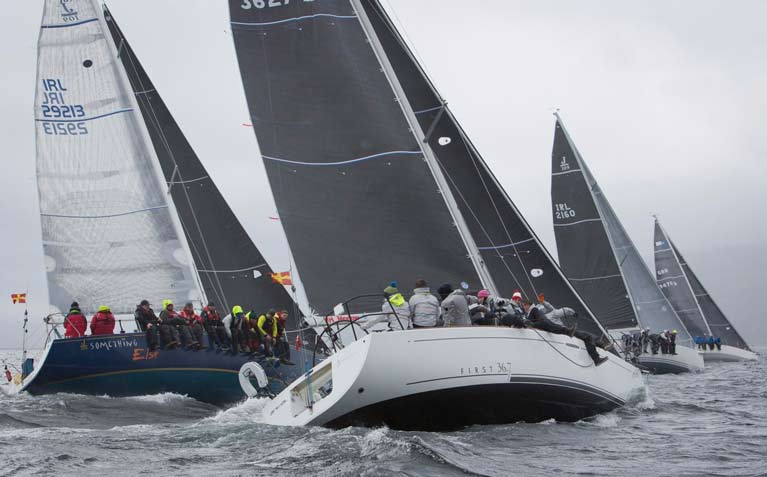 Scottish RC35 champion Animal to windward after a start with Dun Laoghaire's blue-hulled Something Else to leeward Photo: Marc Turner
Scottish RC35 champion Animal to windward after a start with Dun Laoghaire's blue-hulled Something Else to leeward Photo: Marc Turner
Class RC 35
The RC35 class is interesting as it is the only one holding up its numbers. There is a rating band applicable from 1.010 to 1.040 and it has a good following in Scotland. Pat Kelly's J109 Storm II from Rush and Howth, also competes regularly in this class. Storm was the 2018 Class and overall winner of Scottish Series. Other than that, three further Irish boats made the voyage to the Clyde, two J109s from Dun Laoghaire, Andrew Craig's Chimaera and Brian and John Hall's Something Else. Stuart Cranston from Strangford Lough brought the Ker 32 Hijacker for her first outing under new ownership. This Ker had been sailing previously during the last two years in Scotland.
The Top Scottish boat was reckoned to be the Beneteau 36.7 Animal, which had won the Kip Regatta (with Storm second) a fortnight earlier. However, that was a light series and it became apparent that Animal, is not quite the same Animal, when the breeze freshened. The top Scottish boat turned out to be the Corby 33 Jacob VII in fifth place.
The top four places overall ended up being the four Irish boats. Even on Individual races, only Irish boats won races, with Hijacker taking three wins, Storm taking two and Chimaera taking one.
"The win in this very competitive class also gave Andrew Craig the Overall Scottish Series Trophy"
It's not all about winning races though, and Chimaera’s Consistency, with Prof O'Connell calling the shots, never finished outside the top four in any race and gave her the win overall. Both Hijacker and Storm had at least one average race and so Hijacker finished second overall, with Storm third, and a solidly sailed Something Else took fourth.
The win in this very competitive class also gave Chimaera and Andrew Craig the Overall Scottish Series Trophy and was well deserved.
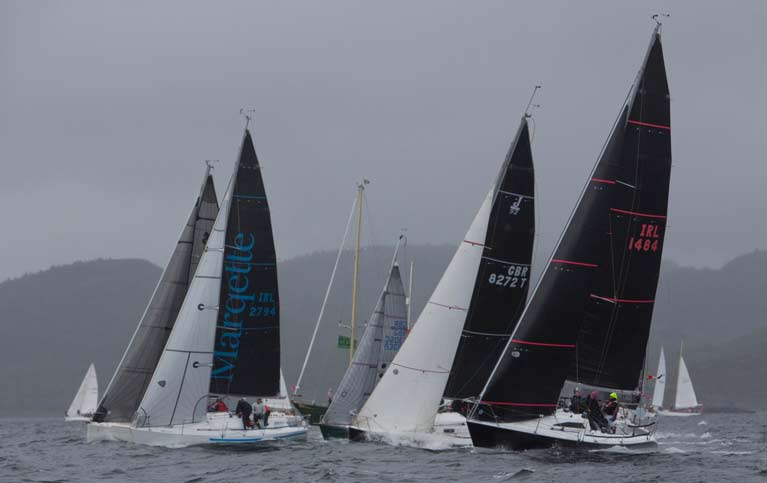 A class three start with Mata (second from left) and overall winner Harmony (right) Photo: Marc Turner
A class three start with Mata (second from left) and overall winner Harmony (right) Photo: Marc Turner
Class 3
Six entries. It was clear from early on that the two modified and upgraded Half tonners from Howth, Johnny Swan's Harmony, and the newly acquired Mata of D and M Wright were going to be the ones to beat. They had their own personal battle, eventually being won by Swan's Harmony. However, when you look at the results and know the story, you will see that it was – or could have been – a very close affair. Mata was the boat disqualified in race three by the Jury for being in the starting area when a previous class was starting. They then went on to win that race but lost it in the protest room. In a no discard series, they ended second overall, but would have won it, had they not been disqualified.
Class 4
Seven entries. This was a one-sided affair, with Rory Fekkes' highly modified First Class Eight winning every race, bar one, to take the overall win from Lady Ex. The only race she lost was due to being OCS in that race, requiring her to return to the line. In the long, around the Loch race, where she was able to plane easily, she won by eight minutes. We will have to wait and see if the Dublin Bay Quarter Tonners and other top boats in Dublin will give her a closer run in next week's ICRA championships in Dun Laoghaire. If the breeze is up in that event though, she will be the one to beat.
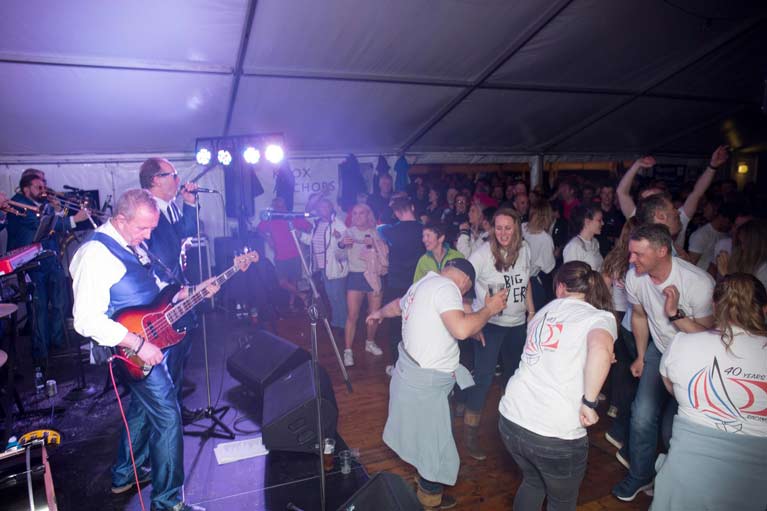 After race partying at Tarbert. The social side of the Scottish Series makes it a great event Photo: Marc Turner
After race partying at Tarbert. The social side of the Scottish Series makes it a great event Photo: Marc Turner
Ashore
Socially, It was, as always, a great event. Post-race drinks in the beer tent were always good, followed by a few more in the Corner House and then later in the night the tent got going again with bands and Ceili Scottish dancing every night, for those who wanted it. The RC35 Class had a great dock party on the Sunday afternoon after racing, kindly sponsored by The Kelly family team from Storm.
This regatta is really worth coming to and is a great warm-up event for those wanting to get a head start in the season.




























